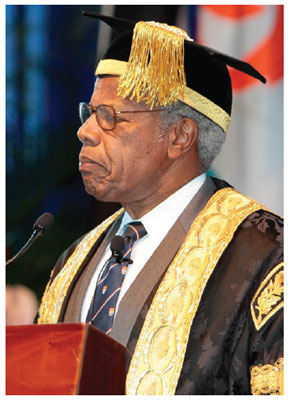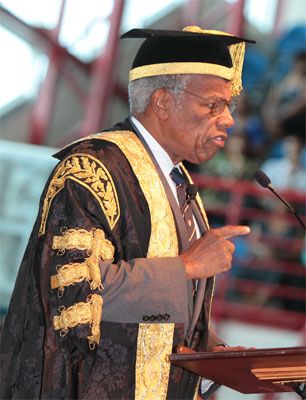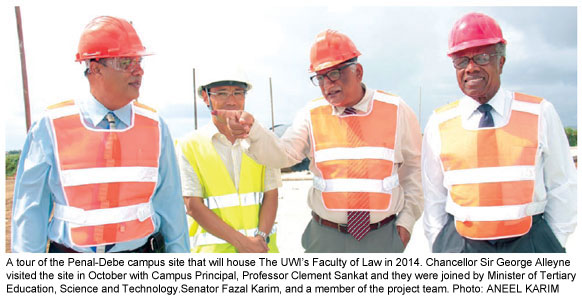
 I am sure you have heard on several occasions how the University has grown in numbers and programmes and how it has continued to dedicate itself to the areas that contribute to Caribbean human development. There are three essential aspects of that development—education, health and economic growth and we can show easily how our teaching and research programmes can contribute to all three. But the knowledge that we do so is not enough and in our current Strategic Plan, there is specific focus on marketing and communication, which are not about public relations, important though that is, but also about widely disseminating information about some of the University’s products. We know that UWI is not the sole academic offering in the Caribbean. Naturally we think it is the best, but we must show potential students that we are the best. I am sure you have heard on several occasions how the University has grown in numbers and programmes and how it has continued to dedicate itself to the areas that contribute to Caribbean human development. There are three essential aspects of that development—education, health and economic growth and we can show easily how our teaching and research programmes can contribute to all three. But the knowledge that we do so is not enough and in our current Strategic Plan, there is specific focus on marketing and communication, which are not about public relations, important though that is, but also about widely disseminating information about some of the University’s products. We know that UWI is not the sole academic offering in the Caribbean. Naturally we think it is the best, but we must show potential students that we are the best.
One of our strengths is research and all Campuses now have research days to showcase their ongoing research and particularly that which is relevant to Caribbean problems. An enhanced example of that was very clearly in evidence at the Research Expo held here a few weeks ago. I hope many of you took the opportunity to visit it as the Campus collaborated with the National Gas Company of Trinidad and Tobago to mount what was really a historic event; for it was a truly impressive display of the wide array of activities that can be harnessed to improve human development in all its dimensions. The project demonstrations, the literature available, the seminars and the workshops represented a major effort by this Campus to demonstrate the wide and varied activities that take place in addition to the teaching and which in fact enhance the quality of the teaching. It was also encouraging to see so many of the projects that were the result of the collaboration with the Government of Trinidad and Tobago through the UWI Government of Trinidad and Tobago Research and Development Impact Fund. One of the particularly impressive aspects was the involvement of children—getting them to become familiar with some basic aspects of science and technology. I must thank the National Gas Company of Trinidad and Tobago for its steadfast and stalwart support.
Clearly there is a wide range of research being carried out and I note the vibrancy of the research in the social sciences. Although we stress the need for science and technology, there can be no even societal development without attention to the social sciences. I was pleased to note that in addition to the generous support from the Government of Trinidad and Tobago, the Campus attracted $35 million for new externally funded projects. We are indeed grateful to these agencies for their support.
The deep involvement in science and technology here is no accident and indeed springs from the origins of the institution. When this campus was established it was the unique locus for engineering and agriculture, both of which have a strong science and technology base. The forerunner of the campus was the Imperial College of Tropical Agriculture which, as its first Principal, Dr. Watts declared, would not fulfill its mandate unless “It can make discoveries and advances in scientific knowledge.” It was heavily oriented to producing the science and technology appropriate for what was considered tropical agriculture.\
There is repeated insistence in the Caribbean on the importance of science and technology for small societies like ours and there are numerous places in which there is activity in this area outside the universities, but in which we play a part. For example, we are involved with the European/CARICOM cooperation project EUCARINET which was funded for four years with a budget of Euro 1.5 million to promote and support multi-stakeholder, bi-regional policy dialogue on science and technology between the EU, Associated States and the Caribbean. There is a Caribbean Science and Technology Council, which has piloted a Caribbean policy on science and technology. But in spite of these and several other initiatives there is the feeling that our governments do not devote enough of their attention or budgets to research and development which I link with science and technology. In at least the larger countries there are ministries of science and technology.
A natural corollary would be a policy on science and technology and I understand one is being crafted with the conviction that countries like this must bank its future prosperity on innovation that comes from science and technology. I trust that the policy considers the possible sources of venture capital which is crucial for taking forward innovation which is often stymied in the Caribbean by lack of venture capital. This is one area that merits serious discussion between the University and the private sector which has to be the source of that capital.
It is difficult to estimate the budget dedicated to research and development as it can be found in many ministries, but in an analysis done six years ago one of our staff made the following statement.
 “Caribbean countries invest little in research and development (R&D). Throughout the region R&D expenditures are estimated to be an average of 0.13% of GDP. This level of investment is considered extremely low by developing countries standards. Indeed, the Caribbean Council for Science and Technology recommends that Caribbean governments should spend at least 3% on active R&D programmes which is the median between that of Small Island Developing States and developed countries”. “Caribbean countries invest little in research and development (R&D). Throughout the region R&D expenditures are estimated to be an average of 0.13% of GDP. This level of investment is considered extremely low by developing countries standards. Indeed, the Caribbean Council for Science and Technology recommends that Caribbean governments should spend at least 3% on active R&D programmes which is the median between that of Small Island Developing States and developed countries”.
The Government of Trinidad and Tobago spends less than 0.1% of its GDP on science, technology and innovation.
One of the aspects of science and technology development which always draws attention and was hotly debated at the last meeting of the CARICOM heads of Government is information and communication technology which is promoted as being critical for Caribbean connectivity and one of the facilitators of our development. This goes beyond the availability of cell phones although, parenthetically, there is impressive penetration of cellular phones in the region, with the highest being in Antigua and Barbuda with 184% and T&T 139% and Barbados and Jamaica about 110%. It also speaks to different ways of learning, doing business and improving public services. It also speaks to our planning for the new developments which will come.
What does all this have to do with the University? First, the University seeks to partner the developments in science and technology in the region. As I have stated here before, innovation ideally develops as a result of partnership between academia, the private sector and government. In addition, UWI places specific emphasis on the ability of its graduates to be knowledgeable in this field. In describing the ideal graduate, our most recent Strategic Plan posited that he or she should be a critical and creative thinker, IT skilled and information literate as well as being innovative and entrepreneurial. If there is to be a science and technology revolution in the region, I expect The University of the West Indies and its graduates to be in the forefront of it.
We certainly produce the quantity and quality of graduates to do so. This year there is a total of 4,092 graduates, and 1,177 of them will be awarded higher degrees; 223 of them graduated with First Class Honours and 21 with distinction. I wish to congratulate them and the Faculty for this achievement. This campus has an enrolment of 18,473 students which come from 16 of the CARICOM countries and in addition there are 41 other nationalities represented here.
During the course of the year there were several new academic programmes introduced at the undergraduate as well as the postgraduate level. We have the first cohort of students graduating in Law and in Optometry. I wish to draw your attention to an example of regional cooperation in education. We have the first graduates from the joint on-line MSc/Diploma Biodiversity Conservation and Sustainable Development in the Caribbean. This is a joint programme The University of the West Indies has launched in association with the Universities of Belize and Guyana and the Anton de Kom University in Suriname. I believe that this is but the first of such ventures and I must congratulate the Principal on the initiative.
The building programme has been impressive. The new teaching and learning complex has made an enormous difference with the provision of new teaching space as well as needed laboratories. There has been a new Student Study and Recreation Facility at Mount Hope. I am pleased to tell you that the development at Penal-Debe, which will cost about $600 million, is proceeding apace and it should be ready for occupancy in one year when it will house the new Faculty of Law in almost idyllic surroundings.
I know that the graduating class will be told that they are entering a difficult world and in this current challenging period, it is not unusual to hear the Cassandras querying whether our region and the regionalism to which UWI is wedded will survive. Of course we will survive, but the nature of that survival and the speed with which we escape the survival mode will in great measure depend on the speed with which we come to terms with the world’s vertiginous change. One of these is the increasing interconnectedness and its consequences. Another is the development and diffusion of technology. What I am urging you graduands and those whom you influence and will influence, is that while avoiding the techno futurism and techno-Utopianism of the dreamers, you insist that research and development, science and technology represent for us one of the mechanisms by which we can manage that change and blunt the effects of size and limitations of physical resources and foster the regional spirit. Smallness of size is not an insuperable barrier to the development of new knowledge or the development of new tools for applying existing knowledge.
I wish you well and ask of you that you be good alumni. One aspect of being good alumni is guarding the regionality of The University of the West Indies. It is not uncommon to hear of the University as being one of the last bastions of the regionalism which was so much a part of the ideals of persons like you in the decades of the fifties and sixties. There was a dream of a single West Indian nation and a single space of our own. There are many who recall the University of those days, when it was an exclusively residential institution, and recall the bonds of friendship formed between the young from the different Caribbean countries. But those days are gone and it is no use hankering after them. We have to look for other structures to foster that regional spirit. But even 40 years ago when CARICOM was born here in Chaguaramas there was the enthusiasm for regionalism. It was very apparent again in 1989 at the signing of the Grand Anse Declaration which recognized the role of the University in providing the human resources need for integration and made the commitment that UWI would remain a regional institution indefinitely.
 There have been doubts about the survival of regionalism and many prescriptions for strengthening the integration process. But when I consider our past and the fact that we have remained in a regional configuration with all its warts and pimples, I have to remember that in the last 40 years we have the fissiparous tendencies in regional groupings come to the fore in Yugoslavia and in Czechoslovakia. Even now we see Scotland making moves for separation from England. So I am reminded of the preamble to the US constitution which says “we the people in order to form a more perfect Union” and think that here in CARICOM we are still in the stage of trying to perfect our union in our own ways. There are many who see the negatives and not the steps being taken to perfect the union. There are many who are impatient at the slowness of implementation without considering the realities of economics or politics. There have been doubts about the survival of regionalism and many prescriptions for strengthening the integration process. But when I consider our past and the fact that we have remained in a regional configuration with all its warts and pimples, I have to remember that in the last 40 years we have the fissiparous tendencies in regional groupings come to the fore in Yugoslavia and in Czechoslovakia. Even now we see Scotland making moves for separation from England. So I am reminded of the preamble to the US constitution which says “we the people in order to form a more perfect Union” and think that here in CARICOM we are still in the stage of trying to perfect our union in our own ways. There are many who see the negatives and not the steps being taken to perfect the union. There are many who are impatient at the slowness of implementation without considering the realities of economics or politics.
In counterpoint I can cite numerous examples of common action which stem from the union, imperfect though it is. But I am comforted when in the recent past I have heard many students, especially our valedictorians, speak passionately about their West Indianness and how they owe it to the University. I am comforted by the conviction of our Vice-Chancellor and the Principals of the four campuses that the Grand Anse Declaration must stand. So I leave you this charge. Do your bit to perfect the union, always conscious that it is a work in progress and none of us may ever see it in its final form, but we can have the vision of what the Promised Land will be and the resolve to get there.
I also charge you as good alumni to begin the culture of giving back to the University. It does not matter how much; the important thing is that you give. Great universities measure the support of their alumni by the numbers who give and less by the quantum of the gifts, although that is important as well. Take an active part in your alumni events and insist on keeping abreast of developments in your university. We will do our part to make the information available to you.
I wish to thank your loved ones here—your significant others—for their support during your time with us. I hope you are pleased with the end result and think that it was all worth it.
This is the address given by Chancellor of The University of the West Indies, Sir George A.O. Alleyne, at the graduation ceremonies held at the St Augustine campus October 24-26, 2013. It was slightly edited for length.

|





